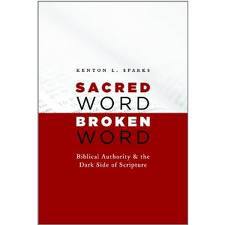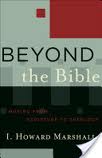 Today we continue our playful romp through Kent Sparks’s recent book Sacred Word, Broken Word: Biblical Authority and the Dark Side of Scripture. (The first post is here and the previous post is here.)
Today we continue our playful romp through Kent Sparks’s recent book Sacred Word, Broken Word: Biblical Authority and the Dark Side of Scripture. (The first post is here and the previous post is here.)
In chapter 10, “Listening to the Diversity and Unity of Scripture,” Sparks begins to tie together the previous chapters and move toward a more positive construction. In other words, he’s been talking about what the Bible is, and now he is going to start talking more about what we are supposed to do with it.
Or, to put it another way, Sparks is going to start cleaning up the mess he’s made (which he always intended to do.)
On the first page of this chapter (p. 103), Sparks asks,
[I]f Scripture speaks the truth through perceptive yet warped human horizons…then how can we use it to weave a useful and coherent understanding of God and of his relationship with us? How can the BIble, as a diverse and broken book, serve as a primary source of our theological insight?
Funny you should ask, Kent, ’cause I’m pretty sure some readers are asking the same thing. [By the way, for those of you who wind up reading this book for yourselves, you will probably find that Sparks eventually gets to the question you are asking. He’s great at anticipating the next point.]
In this chapter Sparks begins to answer his question by outlining no fewer than nine (that’s 9) bullet points. We could camp out on each point for a day or so, but we won’t. I just want to get the points out there with minimal explanation.
1. Biblical interpretation is a “two-step” process that honors the distinction between Scripture as human and divine discourse. Historical criticism and theological (confessional) readings of Scripture need to talk to each other.
2. Seeking theological coherence in Scripture (a function of its divine discourse)  does not cover up, obscure, or explain away the theological differences in Scripture. Respect the difference between Scripture’s “God-talk” (first-order words from God to humanity) and “god-talk-talk” (mistaken, second order human accounts of what God supposedly said).
does not cover up, obscure, or explain away the theological differences in Scripture. Respect the difference between Scripture’s “God-talk” (first-order words from God to humanity) and “god-talk-talk” (mistaken, second order human accounts of what God supposedly said).
3. The brokenness and diversity of Scripture do not negate its essential unity. This is not a God-imposed unity despite the diversity, but an acknowldgement that the human authors and editors of the Bible were “modestly systematic in their efforts to present a coherent theological picture.”
4. The shape and substance of the biblical story explicitly point us to Jesus Christ, who is our theological priority in biblical interpretation. Biblical interpretation ultimately coheres in the person and work of Christ, including when Jesus himself sets aside Old Testament legislation.
5. In giving priority to Christ in biblical interpretation, we are reminded of the brokenness of Scripture and the need to distinguish between “God-talk” and “god-talk-talk” (see #2 above). Christ is the key to help readers distinguish between what in Scripture points us in appropriate and redemptive directions and what bears witness to a broken human situation.
6. #5 does not mean that those portions of Scripture that bear a broken element can be set aside. Rather all biblical texts, witness truly and explicitly to what is theologically true. Even Canaanite genocide passages conveys a deep belief of the ancient Israelites that God is holy and just, even if it was communicated in a broken way.
7. Given #s 5 and 6, one can think of Scripture as a collection of texts that direct and push us in an appropriate direction when taken as a canonical whole. Not every text should be taken as the final word.Where some texts move us too far in one direction, another turns us back.
8. “Progressive revelation” is a good and proper category for understanding the Bible as a whole. God’s continuing conversation with humanity gradually unfolds within the emerging contours of history, although this does not lead to supersessionism (dismissal of earlier stages), or the notion that what is chronologically later necessarily improves upon what is earlier.
 9. A healthy use of Scripture should recognize that good theology cannot depend on Scripture alone. Two examples: Copernicus and the nature of the cosmos, and the immorality of slavery. Moving Beyond the Bible
9. A healthy use of Scripture should recognize that good theology cannot depend on Scripture alone. Two examples: Copernicus and the nature of the cosmos, and the immorality of slavery. Moving Beyond the Bible is necessary for good theology, and is modelled for us in Scripture itself.
In his next chapter, Sparks picks up on this last idea and fleshes it out a bit more. We will get to that soon.
